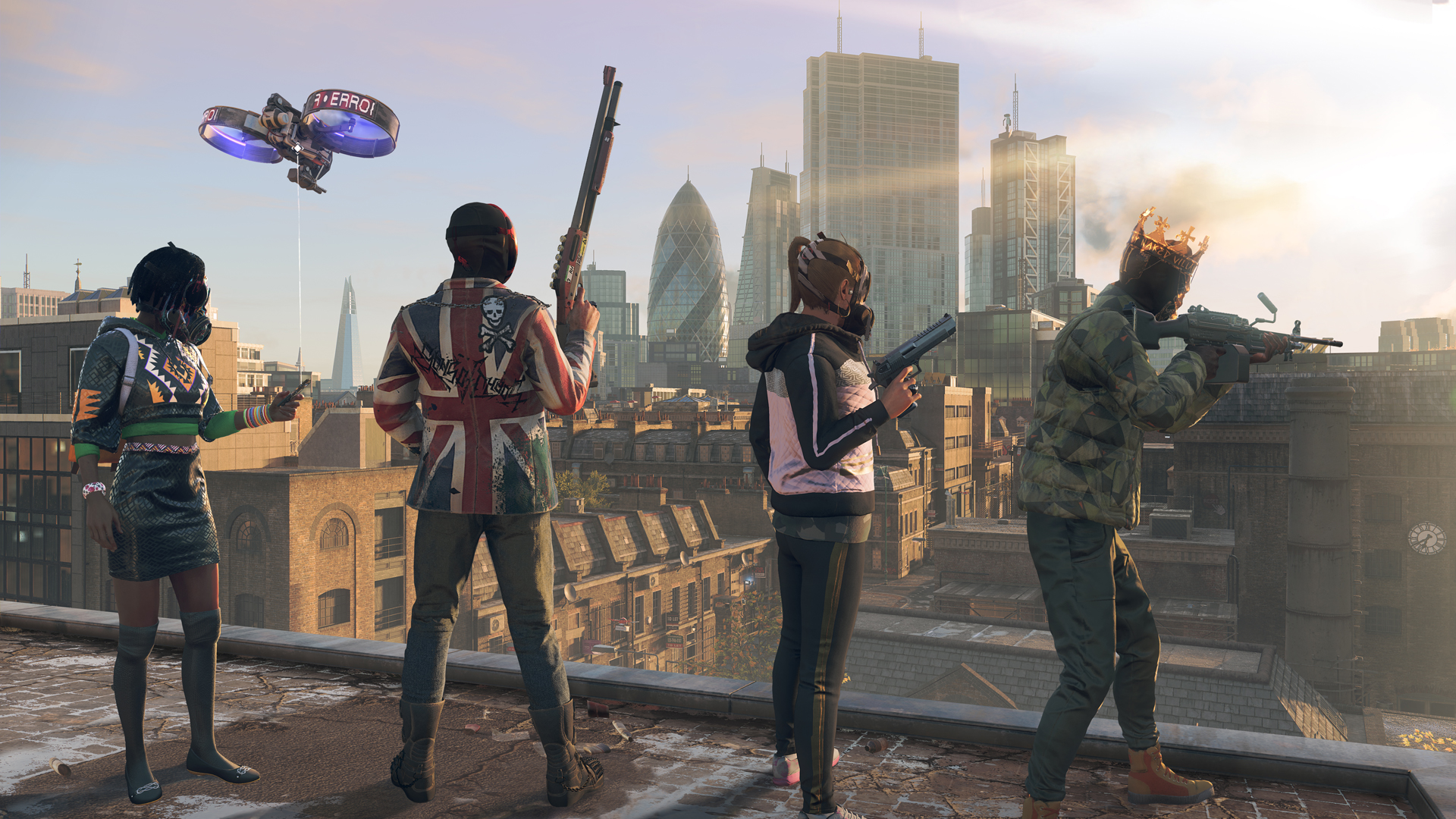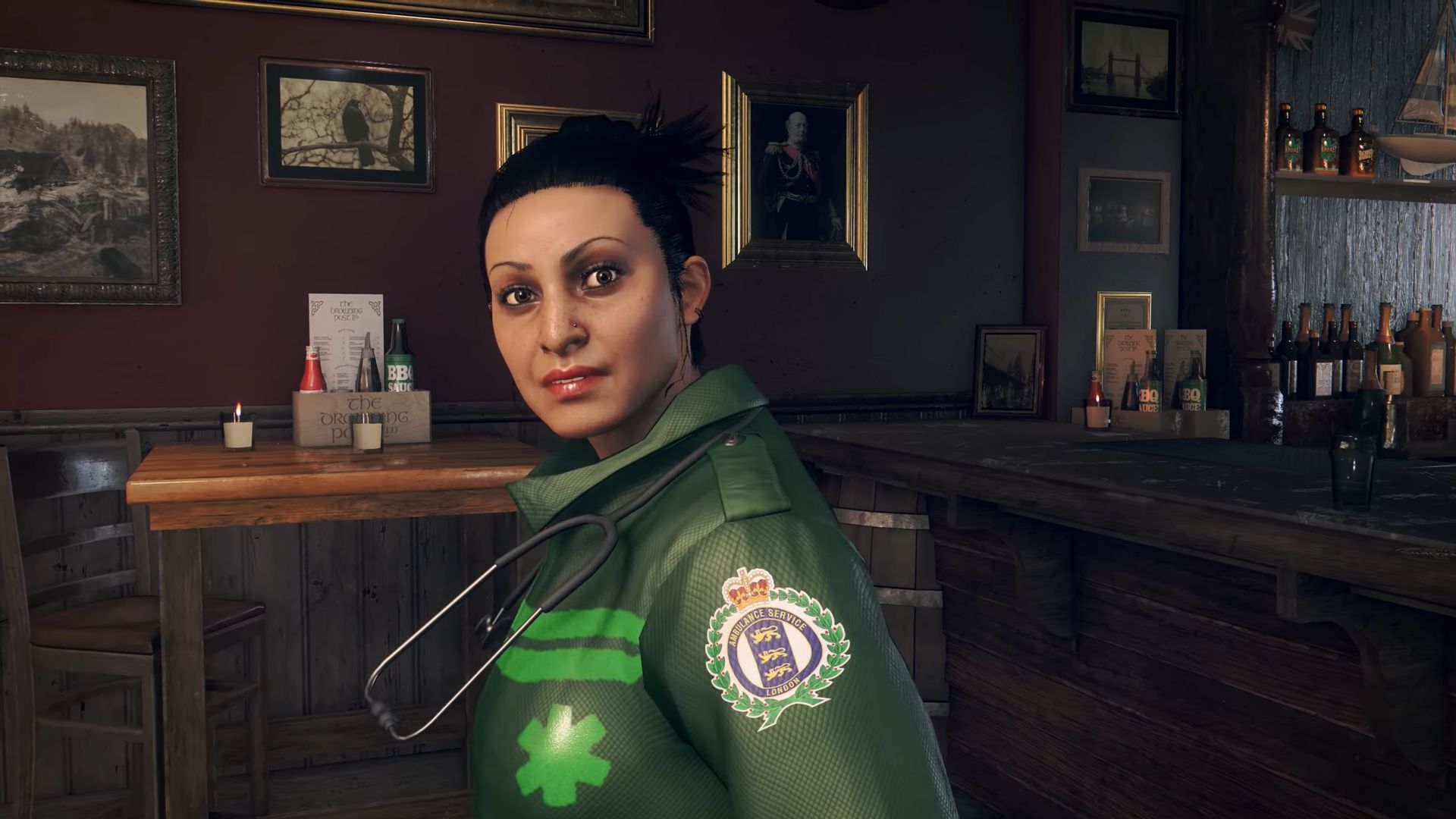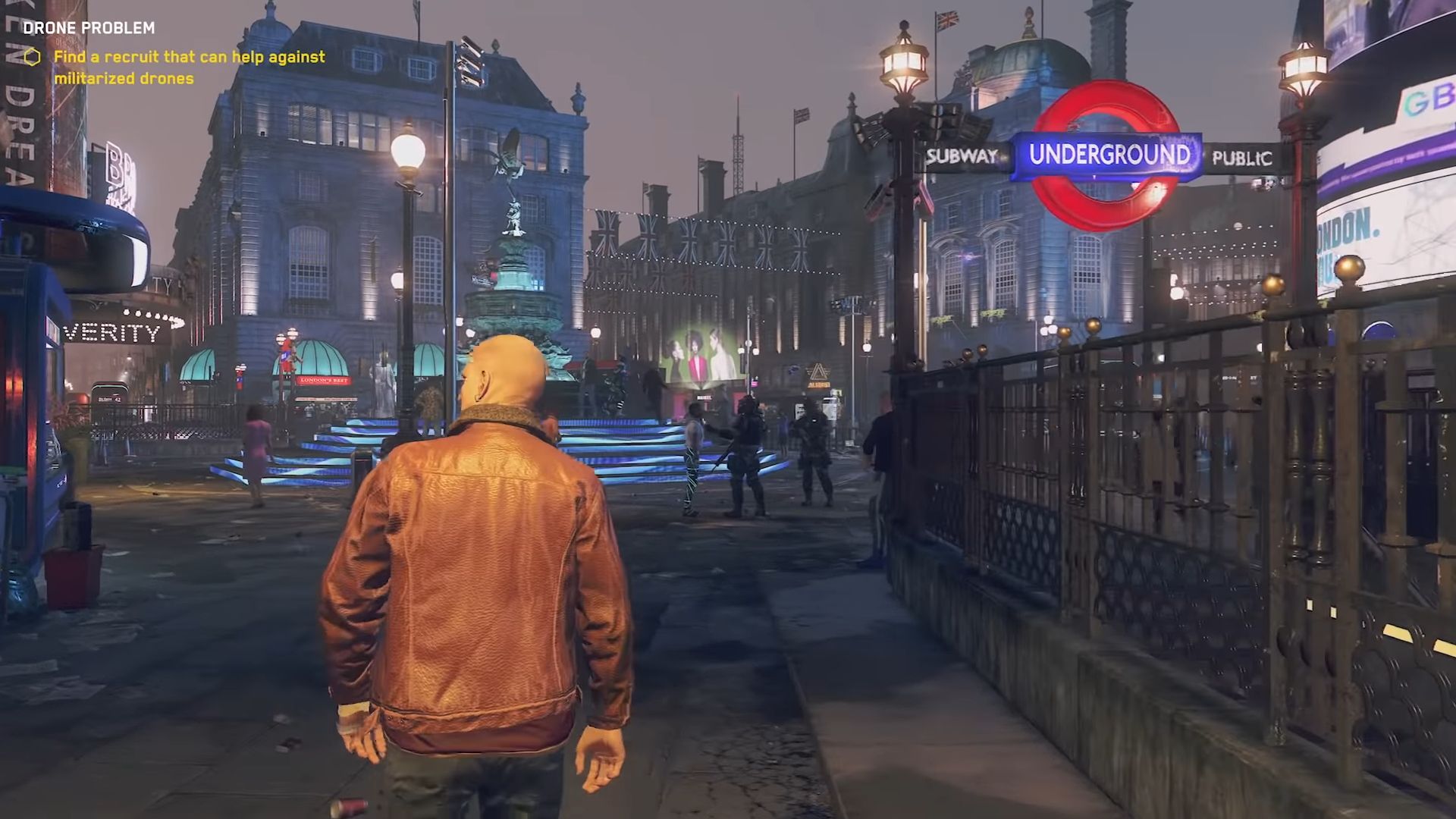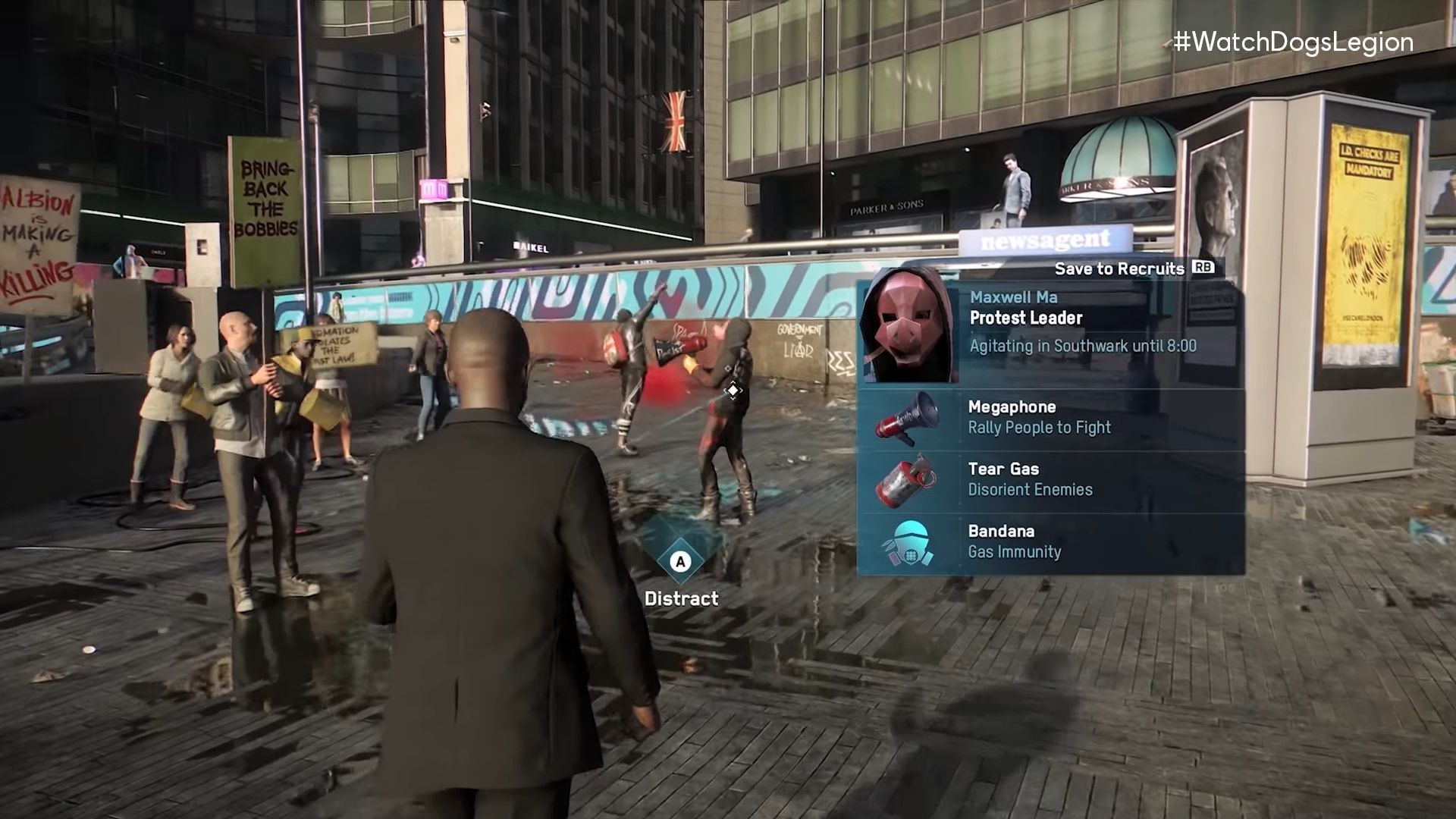Watch Dogs Legion simulates jobs, work schedules, and [checks notes] hiccups and mime in its digital London
There's a whole London's worth of people and fun in Watch Dogs Legion

I don't think you really understand how weird Watch Dogs Legion is probably going to get. The ability to recruit anyone as a playable character means everyone. Spies with cool cars and gadgets? Sure. A policeman that can get into secure areas unbothered? That's kind of the point. Someone with hiccups or a human statue street artist that can hide in plain sight by doing statue poses? Oh, there's the weird.
Job satisfaction
"One thing we joke about is, well, if you profile a gardener should they not hit [people] with a rake? So we added a rake, and the ability to hit people with rakes," explains lead producer Sean Crooks. The core idea behind Watch Dogs Legion has always been to let players build a Dedsec hacker army from a near endless recruitable pool of NPCs, packing a range of talents or abilities. At the initial reveal during last century's 2019 E3, that was largely defined by what looked like randomized stat rolls – better combat abilities, say, or higher proficiencies with different gadgets among some of the options.
However, post E3, the player feedback started to roll in and, as development continued, things started to get funky. "When we started looking at people's reactions at E3 last year, and what people saw in the game, we started to see a lot of feedback," Crooks tells me. "The main thing was that people wanted to feel more substantial differences, rewards and surprises between the characters they could recruit. There was also feedback that fans wanted the jobs to mean something."

Over the last 12 months that's led to one key idea of 'uniform access'. "So, now, when you see a character in the world that has a particular job, if they're tied to a location, like a doctor to a hospital, a guard to a secure area, or a construction worker to a construction site – that actually means something," says Crooks. "Players can take those characters, wear the uniforms, wander through locations and suspicion is a lot lower. They can get away with more, as long as you walk slowly, and don't do anything outstandingly suspicious."
There's obviously a very practical gameplay element to all this in terms of creating a team with the tools and abilities to complete missions. You can even recruit personnel like lawyers and medical staff who will be able to speed up how fast captured or injured characters can become playable again. But there's a deeper simulation element to all this coming from the city itself. "London is basically built from the ground up, based on the demographics of London," Crooks elaborates. "We've created this amazing simulation, everyone has schedules; they move through their calendars; once you profile a person, they will go to their work at the right location."
City life
It means you can apply a lot of real world rules to Watch Dogs Legion and see things work out as you might expect. "I'll give you a great example," says Crooks. "I was playing with a journalist who wanted to find a football hooligan. Hmm. Where would I find a football hooligan? Maybe in a bar? So I [suggested we] check out a pub." At that point though, with no bars marked on the map, or visible nearby, the options were looking slim. Which is where the simulation elements of Legion play out beautifully. "So I told them, 'Actually, look over there. Did you just profile a bartender?' [He] has to go to work at some point. So they check out his profile, and they can see he is indeed going to work at 3pm. They follow him, he goes to a bar, to go to work, and there's a hooligan at the bar having a drink that we can recruit."
Underneath the camera hacking, wall hugging shootouts familiar from the previous two Watch Dogs games there's a far more 'living' world under it all than the previous games have seen. "The way the systems work is amazing. They surprise me. The possibilities are endless," says Crooks. "Some days I'm playing and I'm like, 'Will this work?' and it actually works. The things that the systems can build, and the surprises we get out of it – honestly, we see new stuff all the time, even things we didn't think were possible."
Weekly digests, tales from the communities you love, and more

That level of simulation means that while, so far, Legion has shown off a relatively small range of characters, almost anything you might expect to find in London is possible. Crooks explains that "it's about building the fabric of London in a way that you'd expect to find those things in real-world London. If you explore our London, you'll find similar characters and jobs in those areas too."
So the logic that gives you construction workers on a building site, or doctors in a hospital, populates the entire city. "If you go into areas like Shoreditch in London, you find a lot of counterculture types or street artists, right?" elaborates Crooks. "Imagine that you see someone in the world, and they have a job or a persona or whatnot. We wanted [players] to understand the fantasy, and say: 'Well, if I profile a bus driver, I expect him to have a bus.' And actually, we deliver that."
"If I profile a bus driver, I expect him to have a bus."
Sean Crooks, lead producer
With that level of detail, making a city populated with nothing but useful characters is going to feel weird and unnatural. Which means there's almost everything on offer, with every character having some sort of ability related to who or what they are. There are homeless people that can beg for in-game currency if you want to earn some money on the side for example; musicians that are more likely to be recognized, which might not be helpful if you're trying to run a low profile mission. "We have a range of stuff," says Crooks. "We didn't just go for gameplay abilities, like [calling in] cargo drones for a construction worker. We also went with weird stuff and quirky stuff. Like, for example, if you find a human statue, they have emotes with them custom to [being a] statue." Which sounds like a bit of a fun joke, but it can actually be useful. As Crooks explains: "If you're [in trouble] with Albion security forces, they'll run past if you just do your human statue pose."

Not everything is as useful. "You could even find people with flatulence or hiccups. Trying to do a stealth approach with a character with hiccups is hilarious. It's a good challenge – if you get a chance, I suggest you try it." Ridiculous? Yes. Technically unrealistic? No. Watch Dogs Legion, for all its sci-fi level hacking concepts and army controlled London narrative what-if-ery, is trying to build a realistic world, with all the good and bad that entails. "We talk about real-world logic," Crooks concludes. "We wanted to create situations where people could find fantasies around them, on characters, try them out, and deliver on them. If people can use their ingenuity about how things work in the real world, and the game simulates and delivers on that, then it's going to work really well. So we focused our development and our approach to all the systems around that."

I'm GamesRadar's Managing Editor for guides, which means I run GamesRadar's guides and tips content. I also write reviews, previews and features, largely about horror, action adventure, FPS and open world games. I previously worked on Kotaku, and the Official PlayStation Magazine and website.


